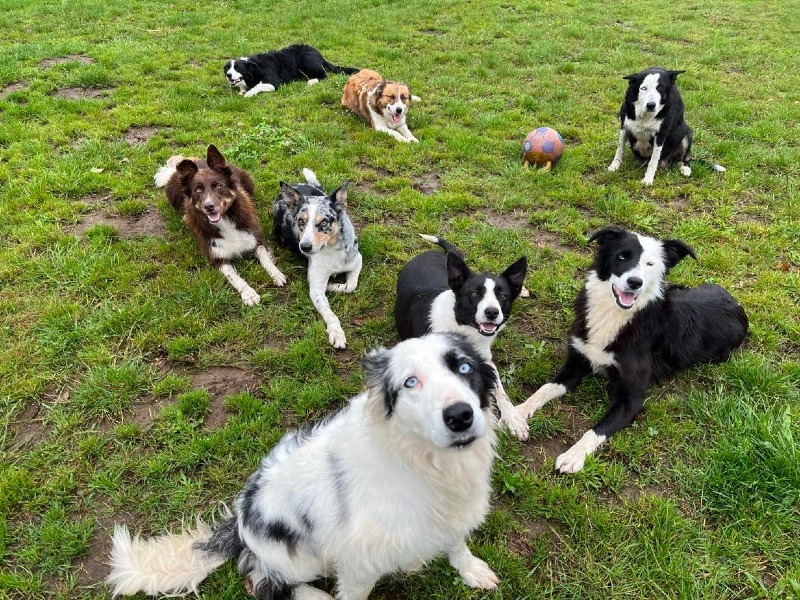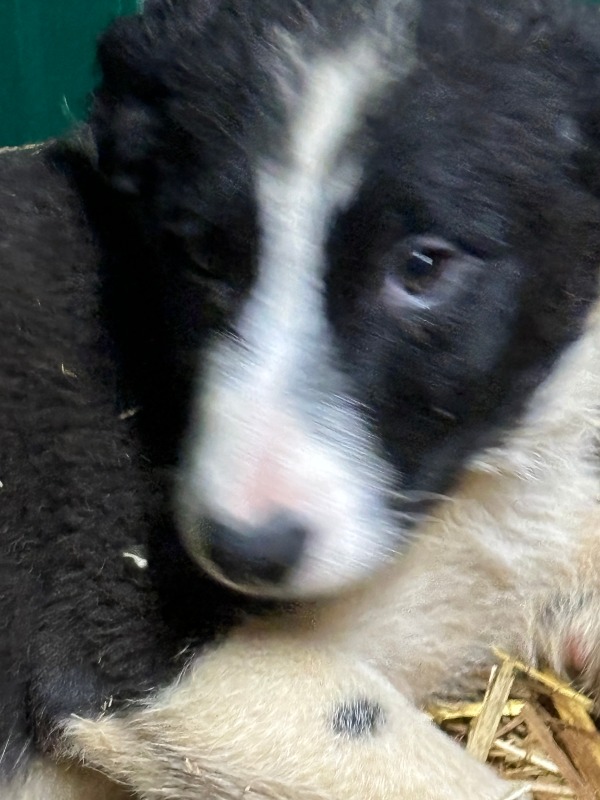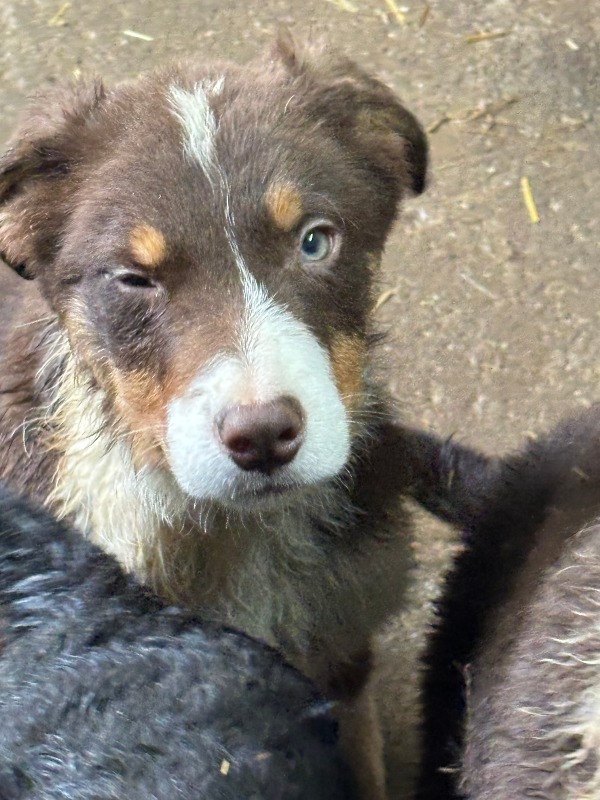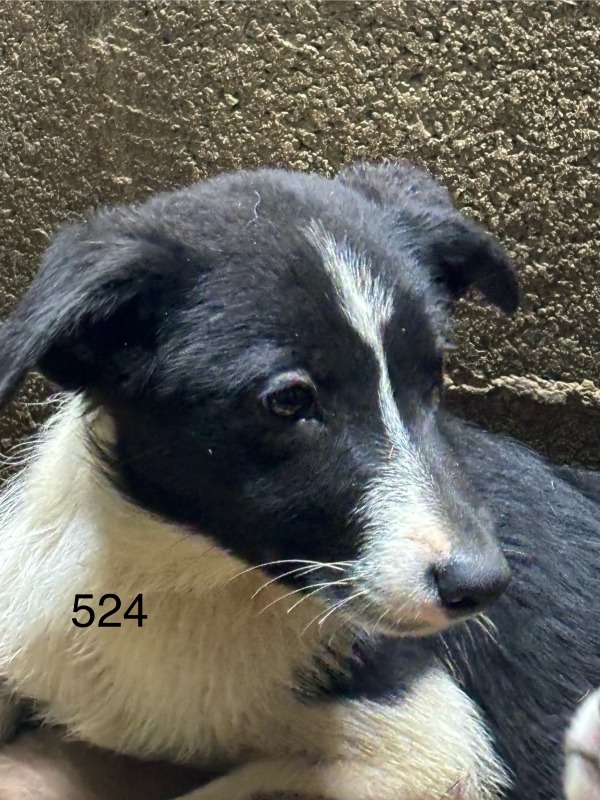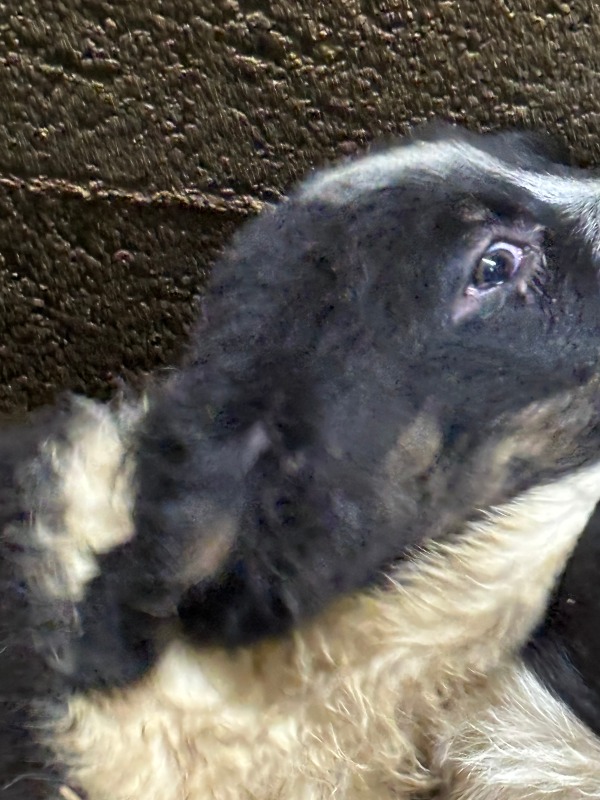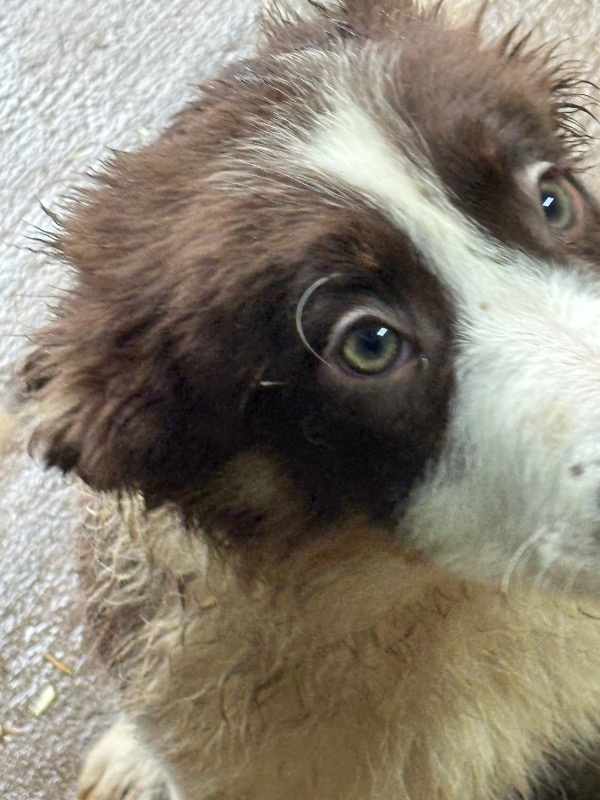Border collie
Welcome to our page dedicated to the breed of dog border collie!
Here, you will find all the useful information about border collie. This descriptive profile will allow you to discover the aspects of this breed. You can notably consult information about the average price, monthly and annual upkeep expenses, their health, name ideas, as well as their official recognition by competent authorities.
Explore this page to discover everything you need to know.
Overall description of the breed
The Border Collie, native to the United Kingdom and more specifically to the Scottish Borders region on the border between England and Scotland, is the shepherd dog par excellence. The first descriptions of this type of dog date back to the 17ᵉ century, but for a long time it was regarded solely as a working dog, without shepherds or breeders paying any attention to beauty criteria. In fact, it is one of the few breeds that is judged on its ability to herd rather than its morphological proportions.
The Border Collie is the result of crosses between different breeds, notably the Bobtail, the Bearded Collie and hunting dogs such as the Setter. Working is very much in their genes, making them exceptionally good at herding. Its instinct for herding and its ability to anticipate animal movements make it an indispensable partner for shepherds.
In physical terms, Border Collies are elegant, athletic dogs. They have a harmonious, well-proportioned and muscular body. Their head is expressive, with almond-shaped eyes that reflect their intelligence and alertness. Their ears are generally erect or semi-erect. The coat can be short or medium-length, and there is a wide variety of colours and patterns, from classic black and white to blue merle, red, tricolour or chocolate.
The average weight of a Border Collie is between 18 and 28 kg (40 and 60 lbs). Height generally varies from 46 cm to 56 cm (18" to 22").
The founding breed club is the Border Collie Club of Great Britain, established in 1973 in the UK to promote and preserve the breed. The breed standard was established in 1994.
The Border Collie was definitively recognised by the FCI on 27 September 1977. It is included in Group 1 (Sheepdogs and Cattle Dogs) of the FCI classification.
Border Collies are extremely intelligent and energetic dogs. They are quick-witted and have a strong desire to learn and work. They are known for their great trainability and obedience. However, because of their high energy levels, they need regular mental and physical stimulation to thrive. This is a dog that adapts well to a variety of activities, whether agility, obedience, rhythmic obedience or even herding.
In conclusion, the Border Collie is an exceptional breed of dog, renowned for its working skills and remarkable intelligence. It is a dog that requires active commitment from its owner to meet its physical and mental needs. With its devoted nature and incredible ability to learn, the Border Collie is an ideal companion for people looking for an active, highly motivated partner.
Awareness of acquiring an animal
Each animal is a sensitive being, deserving love, attention and care.
When you choose to adopt an animal, you take on the responsibility of ensuring its health and well-being throughout its life.
To learn more about animal welfare, we invite you to consult our FAQ by clicking the button below:
Origins
The Border Collie is originally from the borders between Scotland and England, hence its name. It is the result of crossings between different British shepherd dogs, aiming to obtain an exceptional animal for guarding and herding flocks. Its selection was based mainly on its working skills rather than its physical appearance. The first Border Collies appeared in the 19th century, but their ancestors date back centuries of breeding shepherd dogs in this region. Their intelligence, agility, and endurance quickly made them favorites of shepherds and sheep breeders, thus contributing to the preservation of this exceptional breed.
History
The history of the Border Collie is closely linked to that of sheep breeding in Great Britain. During the 19th century, the breed distinguished itself with exceptional skills as a sheepdog. Named after the border region between Scotland and England, the Border Collie was perfected to meet the requirements of local shepherds. The dog "Old Hemp" is often cited as the father of the modern breed, excelling in sheepdog competitions towards the end of the 1800s. His lineage laid the foundations for the current standards. Today, the Border Collie is not only a high-performing working dog, but also a beloved companion worldwide.
Standard
The standard of the Border Collie breed is defined by several international canine organizations, including the Fédération Cynologique Internationale (FCI) and the Kennel Club in the United Kingdom. The Border Collie should have a harmonious and athletic appearance, reflecting its agility and endurance. The head is proportionate with a moderately wide skull, semi-erect or erect ears, and almond-shaped eyes, often brown or blue. The body is muscular, with a deep chest and well-sprung ribs. The tail is moderately long, carried low with a slight curve. Movements should be fluid and effortless, showing the ability to work long hours without fatigue.
Physical characteristics
The Border Collie is a medium-sized dog, measuring between 48 and 56 cm at the withers for males, and between 46 and 53 cm for females. Its weight generally varies from 14 to 20 kg. It has a double coat, with a dense and moderately long outer layer, and a soft and thick undercoat. The coat colors are varied, with the most common being black and white, but it can also be blue merle, red merle, tricolor, sand and white, among others. The eyes are bright and expressive, often brown or blue, sometimes one of each color. Its ears are semi-erect, adding to its alert and intelligent appearance.
Character
The Border Collie is known for its exceptional intelligence and desire to work. It is lively, alert, and extremely responsive to its master's commands. This breed is very energetic and requires constant mental and physical stimulation. Loyal and devoted, the Border Collie is also very affectionate with its family, but can be reserved with strangers. It has a strong herding instinct, which can be seen in its interactions with children or other animals. Its docile and obedient nature makes it an excellent working dog, as well as a loving and loyal companion for those who can meet its demanding needs.
Life expectancy
The average life expectancy of a Border Collie is typically long for a dog of its size, ranging from 12 to 15 years. With proper care, some Border Collies can even live beyond this range. To ensure a long and healthy life, it is crucial to provide a balanced diet, regular exercise, and periodic veterinary visits. Preventing common diseases, such as hip dysplasia and certain hereditary eye diseases, is essential. Border Collies with an active lifestyle and constant mental stimulation tend to have a better quality of life and can therefore live longer in good health.
Exercise and activity needs
The Border Collie has very high exercise needs, well above the average of other breeds. It requires at least two hours of intense physical activity every day to stay happy and healthy. Walks, fetch games, and especially canine sports such as agility, flyball, or herding trials are excellent for them. In addition, they need constant mental stimulation, such as puzzle games or tasks to accomplish. Without enough activity, the Border Collie can become destructive or develop problematic behaviors. It is therefore essential to offer them an active and stimulating lifestyle.
Recommended diet
The diet of a Border Collie must be balanced and adapted to its high level of activity. A diet rich in quality proteins is essential to support its muscle mass and energy. Premium kibble or a balanced homemade diet, potentially supplemented with vitamins and minerals, are recommended. On average, food costs for a Border Collie range between 40 and 70 euros per month, depending on the quality of the chosen food and the specific needs of the dog. It is important to monitor its weight and adjust portions according to its activity to prevent obesity, while ensuring adequate hydration.
Training and obedience
Education and training of the Border Collie should start at a young age. Due to their exceptional intelligence, they learn quickly but require constant mental stimulation to avoid boredom. Positive training methods, based on rewards, are particularly effective with this breed. It is crucial to vary exercises to maintain their interest and develop their skills. The Border Collie excels in disciplines such as agility, obedience, and herding work. Early socialization is also important so they can interact positively with other animals and people. Consistency and patience are the keys to successful training.
Behavior with children
The Border Collie is generally good with children, especially if properly socialized from a young age. Its herding instinct can sometimes lead it to "gather" children, which may include behaviors like running around them or lightly nipping. With proper training, these behaviors can be minimized. Border Collies are protective and affectionate towards their family members, including children. It is important to teach children how to interact respectfully with the dog to avoid misunderstandings. Supervision is recommended, especially with young children, to ensure a harmonious cohabitation.
Compatibility with Other Animals
The Border Collie, when well-socialized, can get along with other pets. However, its strong herding instinct can sometimes push it to want to control or lead other animals, which can cause tension. A gradual and supervised introduction is recommended to promote good relations. With dogs, the Border Collie is generally sociable and can cohabitate well, especially if it has been accustomed to canine company from a young age. For cats and small animals, careful supervision is necessary until the Border Collie learns to accept them without trying to "herd" them.
Grooming needs
The Border Collie requires regular grooming to maintain the health and appearance of its coat. A weekly brushing is sufficient to remove dead hair and prevent knots, although during shedding periods, more frequent brushing may be necessary. Its double coat effectively protects against the weather, but may require an occasional bath, especially if it gets dirty during outdoor activities. The ears should be checked and cleaned regularly to prevent infections. The teeth should be brushed several times a week to prevent dental problems. Paying special attention to the claws is also important to prevent them from becoming too long.
Health
The Border Collie is generally a robust and healthy breed, but it can be predisposed to certain genetic conditions. Among the most common health issues are hip dysplasia, eye diseases such as progressive retinal atrophy (PRA) and collie eye anomaly (CEA), as well as some epileptic conditions. It is essential to have regular health checks and to choose breeders who conduct genetic tests on their breeding dogs to minimize the risks of these diseases. A balanced diet, regular exercise, and appropriate veterinary care all help to keep the Border Collie healthy throughout its life.
Average price
The price of a Border Collie can vary significantly depending on several factors, including age, pedigree, and breeder reputation. Generally, the price of a Border Collie puppy from a good lineage ranges from 600 to 1500 euros. Puppies from champion bloodlines or with proven working skills can cost more. In addition to the initial purchase cost, it is important to consider ongoing expenses for maintenance, food, veterinary care, and training. Investing in a quality Border Collie ensures not only a healthy companion, but also a dog capable of meeting high expectations in terms of work and companionship.
Expenses
Monthly expenses for a Border Collie can vary depending on its specific needs, diet, and activity level. On average, it is necessary to budget between 60 and 120 euros per month. This budget includes quality food, treats, preventive veterinary care, and grooming products. Costs may increase if additional expenses such as training classes, canine sports activities, or unforeseen veterinary care are required. Owners should also consider expenses for toys and equipment, as the Border Collie needs constant mental and physical stimulation to stay happy and healthy.
Name ideas
Choosing a name for your Border Collie is an important and enjoyable step. Here are some suggestions that are suitable for this intelligent and energetic breed: Max, Bella, Finn, Luna, Ace, Zoe, Scout, Milo, Daisy, Rex, Willow, Blue, Jax, Rosie, Leo, Skye, Rocky, Ruby, Harley, Jasper. A good name should be easy to pronounce and remember, both for you and your dog. Take the time to observe his behavior and personality, which can inspire you to find a perfectly fitting name. A well-chosen name facilitates communication and strengthens the bond between you and your Border Collie.
Legislation and regulation
In France, the Border Collie is not classified among so-called "dangerous" dogs, so it is not subject to specific restrictions. However, as with all dogs, owners must meet certain legal obligations. The dog must be identified by a microchip or a tattoo, and registered with the ICAD (Identification of Domestic Carnivores). Mandatory vaccinations, especially against rabies, must be up to date. It is also recommended to take out civil liability insurance. In public places, the dog must be kept on a leash, and some municipalities may impose additional restrictions. It is important to inquire about local regulations to ensure a harmonious coexistence with other citizens.
Official recognition
The Border Collie is officially recognized by several international canine organizations. The Fédération Cynologique Internationale (FCI) in Europe, the Kennel Club in the United Kingdom, the American Kennel Club (AKC) in the United States, and the Canadian Kennel Club (CKC) in Canada all recognize this breed. In France, the Société Centrale Canine (SCC) manages the registrations and pedigrees of Border Collies. These organizations establish breed standards, organize shows and competitions, and promote and preserve the breed. Official recognition guarantees the purity and quality of the bloodlines, and helps breeders maintain ethical and responsible practices.
Pedigrees
Quality Border Collies are often registered in pedigree registries held by recognized clubs and associations. In France, the Société Centrale Canine (SCC) is the official organization for registering Border Collies. The Kennel Club in the UK, the American Kennel Club (AKC) in the United States, and the Canadian Kennel Club (CKC) in Canada are also references for pedigrees. These clubs ensure the traceability of lineages, thus guaranteeing the purity and standards of the breed. Serious and ethical breeders use these registries to document and certify their dogs, providing owners with assurance of quality and compliance with breed standards.
Destination and usage
The Border Collie is mainly used as a shepherd dog because of its intelligence and natural ability to work with herds. However, its versatility allows it to excel in various other activities. It is very successful in canine sports such as agility, obedience, flyball, and herding competitions. Outside of these activities, the Border Collie is also an excellent companion dog for active families and people who enjoy spending time outdoors. Its constant need for mental and physical stimulation makes it an ideal companion for sporty and committed owners.
Prohibitions
There are no specific prohibitions concerning the possession or breeding of Border Collies in France. However, owners must comply with general laws regarding dog ownership, including mandatory identification and registration with the ICAD. Local rules may impose restrictions on the presence of dogs in certain public spaces, such as parks and beaches, where they must often be kept on a leash. Furthermore, any neglect or mistreatment of an animal is punishable by law. It is essential to comply with local and national regulations to ensure the well-being of the dog and harmonious cohabitation with the community.
Breeders of Border collie
Want to see more breeders of Border collie?
Check out the page of our directory listing all breeders of Border collieClassified Ads of Border collie
Breed clubs of border collie
No of border collie breed clubs are currently registered on Preeders.
If you would like to highlight your breed club, sign up for free now and be the first to appear on this page.

